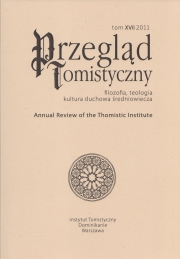Łaska w perspektywie teologicznego sporu i ekumenii
Grace in View of Theological Dispute and Ecumenism
Author(s): Otto Hermann PeschSubject(s): Christian Theology and Religion, Middle Ages, Theology and Religion
Published by: Instytut Tomistyczny
Summary/Abstract: In presenting the evolution of the concept of grace in patristic and medieval theology, Otto Herman Pesch reveals a misunderstanding underlying the Lutheran-Catholic dispute over justification. Grace as habitus and qualitas was introduced to Christian theology to raise a final barrier against Pelagian temptations. With the passage of time, and contrary to the original intention, a transformation of the concept of grace took place in theory as well as in pastoral practice, so that people began to believe that it was necessary for man to perform, by natural means, a meritious act (meritum de congruo) in order to receive the grace necessary for salvation. This led Luther to oppose the concept of grace as habitus – for the same reason, ironically, for which this concept was introduced (that is, he opposed a Pelagian model of salvation). After having explained the historical misunderstandings involved in this theory of grace, it can be asserted, as the author argues, that there is no contradiction between the actual teaching of the Council of Trent and Luther’s famous thesis, Sola gratia. ‘Only grace’ surely stands at the foundation and the beginning of man’s relationship to God. This, however, does not contradict the fact that God’s influence produces a real effect in creation and brings to the individual an experience of reconstituted freedom – that is, an experience of completely personal freedom that is, at the same time, entirely the result of God’s grace.
Journal: Przegląd Tomistyczny
- Issue Year: 2011
- Issue No: XVII
- Page Range: 307-328
- Page Count: 22
- Language: Polish

